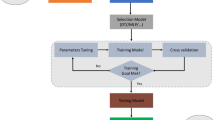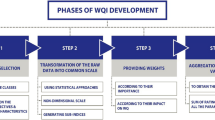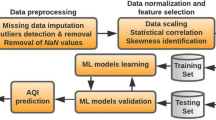Abstract
The quality of surface waters plays a key role in the sustainability of ecological systems. Measuring water quality parameters (WQPs) is of high importance in the management of surface water resources. In this paper, contemporary-developed regression analysis was proposed to estimate the hard-to-measure parameters from those that can be measured easily. To this end, we proposed a novel modification of support vector regression (SVR), known as multiple-kernel support vector regression (MKSVR) algorithm. The MKSVR learns an optimal data representation for regression analysis by either linear or nonlinear combination of some precomputed kernels. For solving the optimization problem of the MKSVR, the particle swarm optimization (PSO) algorithm was used. The proposed algorithm was assessed using WQPs taken from Karun River, Iran. MKSVR was used to estimate chemical oxygen demand (COD) and biochemical oxygen demand (BOD) using nine WQPs as the input variables, namely electrical conductivity, sodium, calcium, magnesium, phosphate, nitrite, nitrate nitrogen, turbidity, and pH. The results of the proposed MKSVR were compared with those obtained using the SVR and Random Forest regression (RFR). The results showed that the MKSVR algorithm (correlation coefficient [R] = 0.8 and root mean squared error [RMSE] = 4.76 mg/l) increased the accuracy level of BOD prediction when compared with SVR (R = 0.68 and RMSE = 5.15 mg/l) and RFR (R = 0.77 and RMSE = 5.15 mg/l). In the case of COD estimation, the performance of a developed support vector machine (SVM) technique was satisfying. Overall, the use of MKSVR along with the PSO algorithm could demonstrate the superiority of the newly developed SVM technique for the WQPs estimation in the natural streams.







Similar content being viewed by others
References
Abbasnejad, M. E., Ramachandram, D., & Mandava, R. (2012). A survey of the state of the art in learning the kernels. Knowledge and Information Systems, 31(2), 193–221.
Ahmadianfar, I., Jamei, M., & Chu, X. (2020). A novel hybrid wavelet-locally weighted linear regression (W-LWLR) model for electrical conductivity (EC) prediction in surface water. Journal of Contaminant Hydrology, 232, 103641.
Ay, M., & Kisi, O. (2011). Modeling of dissolved oxygen concentration using different neural network techniques in Foundation Creek, El Paso County, Colorado. Journal of Environmental Engineering, 138(6), 654–662.
Bansal, J. C., Singh, P., Saraswat, M., Verma, A., Jadon, S. S., & Abraham, A. (2011). Inertia weight strategies in particle swarm optimization. In 11 third world congress on nature and biologically inspired computing (NaBIC)s (pp. 633–640) IEEE.
Bozorg-Haddad, O., Soleimani, S., & Loáiciga, H. A. (2017). Modeling water-quality parameters using genetic algorithm–least squares support vector regression and genetic programming. Journal of Environmental Engineering, 143(7), 04017021.
Bucak, S. S., Jin, R., & Jain, A. K. (2014). Multiple kernel learning for visual object recognition: A review. IEEE Transactions on Pattern Analysis and Machine Intelligence, 36(7), 1354–1369.
Camps-Vails, G., Bruzzone, L., Rojo-Álvarez, J., & Melgani, F. (2006). Robust support vector regression for biophysical variable estimation from remotely sensed images. IEEE Geoscience and Remote Sensing Letters, 3(3), 339–344.
Cortes, C., Mohri, M., & Rostamizadeh, A. (2009). Learning non-linear combinations of kernels. In Advances in neural information processing systems (pp. 396–404).
Cortes, C., & Vapnik, V. (1995). Support-vector networks. Machine Learning, 20(3), 273–297.
Emamgholizadeh, S., Kashi, H., Marofpoor, I., & Zalaghi, E. (2014). Prediction of water quality parameters of Karoon River (Iran) by artificial intelligence-based models. International Journal of Environmental Science and Technology, 11(3), 645–656.
Gonen, M., & Alpaydin, E. (2010). Localized multiple kernel regression. In 2010 20th international conference on pattern recognition (pp. 1425–1428) IEEE.
Gönen, M., & Alpaydın, E. (2011). Multiple kernel learning algorithms. Journal of Machine Learning Research, 12, 2211–2268.
Gunn, S. R. (1998). Support vector machines for classification and regression. ISIS Technical Report, 14(1), 5–16.
Heddam, S., & Kisi, O. (2018). Modelling daily dissolved oxygen concentration using least square support vector machine, multivariate adaptive regression splines and M5 model tree. Journal of Hydrology, 559, 499–509.
Jamei, M., Ahmadianfar, I., Chu, X., & Yaseen, Z. M. (2020). Prediction of surface water total dissolved solids using hybridized wavelet-multigene genetic programming: New approach. Journal of Hydrology, 589, 125335.
Jamei, M., & Ahmadianfar, I. (2020). A rigorous model for prediction of viscosity of oil-based hybrid nanofluids. Physica A Statistical Mechanics and its Applications, 556, 124827.
Jamei, M., Ahmadianfar, I., Olumegbon, I. A., Karbasi, M., & Asadi, A. (2021). On the assessment of specific heat capacity of nanofluids for solar energy applications: Application of Gaussian process regression (GPR) approach. Journal of Energy Storage, 33, 102067.
Kloft, M., Brefeld, U., Sonnenburg, S., & Zien, A. (2011). Lp-norm multiple kernel learning. The Journal of Machine Learning Research, 12, 953–997.
Li, X., Sha, J., & Wang, Z.-L. (2017). A comparative study of multiple linear regression, artificial neural network and support vector machine for the prediction of dissolved oxygen. Hydrology Research, 48(5), 1214–1225.
Mukherjee, S., Osuna, E., & Girosi, F. (1997). Nonlinear prediction of chaotic time series using support vector machines. In Neural networks for signal processing [1997] VII. Proceedings of the 1997 IEEE workshop (pp. 511–520) IEEE.
Najafzadeh, M., & Ghaemi, A. (2019). Prediction of the five-day biochemical oxygen demand and chemical oxygen demand in natural streams using machine learning methods. Environmental Monitoring and Assessment., 191(6), 380.
Najafzadeh, M., Ghaemi, A., & Emamgholizadeh, S. (2018). Prediction of water quality parameters using evolutionary computing-based formulations. International Journal of Environmental Science and Technology, 16(10), 6377–6396.
Niazmardi, S., Demir, B., Bruzzone, L., Safari, A., & Homayouni, S. (2016). A comparative study on Multiple Kernel Learning for remote sensing image classification. In 2016 IEEE international geoscience and remote sensing symposium (IGARSS) (pp. 1512–1515) IEEE.
Niazmardi, S., Demir, B., Bruzzone, L., Safari, A., & Homayouni, S. (2018). Multiple kernel learning for remote sensing image classification. IEEE Transactions on Geoscience and Remote Sensing, 56(3), 1425–1443. https://doi.org/10.1109/TGRS.2017.2762597
Niazmardi, S., Shang, J., McNairn, H., & Homayouni, S. (2013). A new classification method based on the support vector regression of NDVI time series for agricultural crop mapping. In 2013 second international conference on agro-geoinformatics (Agro-Geoinformatics) (pp. 361–364) IEEE.
Pourrajab, R., Ahmadianfar, I., Jamei, M., & Behbahani, M. (2020). A meticulous intelligent approach to predict thermal conductivity ratio of hybrid nanofluids for heat transfer applications. Journal of Thermal Analysis and Calorimetry. https://doi.org/10.1007/s10973-020-10047-9
Qiu, S., & Lane, T. (2005). Multiple kernel learning for support vector regression. Computer Science Department, The University of New Mexico, Albuquerque, NM, USA, Technical Report (p. 1).
Qiu, S., & Lane, T. (2009). A framework for multiple kernel support vector regression and its applications to siRNA efficacy prediction. IEEE/ACM Transactions on Computational Biology and Bioinformatics (TCBB), 6(2), 190–199.
Rakotomamonjy, A., Bach, F., Canu, S., & Grandvalet, Y. (2008). SimpleMKL. Journal of Machine Learning Research, 9, 2491–2521.
Rojo-Álvarez, J. L., Muñoz-Marí, J., Camps-Valls, G., & Martínez-Ramón, M. (2018). Digital signal processing with Kernel methods. Wiley.
Scholkopf, B., & Smola, A. J. (2001). Learning with kernels: Support vector machines, regularization, optimization, and beyond. MIT Press.
Sengupta, S., Basak, S., & Peters, R. A. (2019). Particle Swarm optimization: A survey of historical and recent developments with hybridization perspectives. Machine Learning and Knowledge Extraction, 1(1), 157–191.
Shi, Y., & Eberhart, R. C. (1998). Parameter selection in particle swarm optimization. In International conference on evolutionary programming (pp. 591–600).
Singh, K. P., Basant, A., Malik, A., & Jain, G. (2009). Artificial neural network modeling of the river water quality—A case study. Ecological Modelling, 220(6), 888–895.
Smola, A. J., & Schölkopf, B. (2004). A tutorial on support vector regression. Statistics and Computing, 14(3), 199–222.
Soltani, F., Kerachian, R., & Shirangi, E. (2010). Developing operating rules for reservoirs considering the water quality issues: Application of ANFIS-based surrogate models. Expert Systems with Applications, 37(9), 6639–6645.
Svetnik, V., Liaw, A., Tong, C., Culberson, J. C., Sheridan, R. P., & Feuston, B. P. (2003). Random Forest: A Classification and Regression Tool for Compound Classification and QSAR Modeling. Journal of Chemical Information and Computer Sciences, 43(6), 1947–1958. https://doi.org/10.1021/ci034160g.
Trelea, I. C. (2003). The particle swarm optimization algorithm: Convergence analysis and parameter selection. Information Processing Letters, 85(6), 317–325.
Tuia, D., Verrelst, J., Alonso, L., Pérez-Cruz, F., & Camps-Valls, G. (2011). Multioutput support vector regression for remote sensing biophysical parameter estimation. IEEE Geoscience and Remote Sensing Letters, 8(4), 804–808.
Vapnik, V. (2013). The nature of statistical learning theory. Springer.
Varma, M., & Babu, B. R. (2009). More generality in efficient multiple kernel learning. In Proceedings of the 26th annual international conference on machine learning (pp. 1065–1072) ACM.
Verma, A., & Singh, T. (2013). Prediction of water quality from simple field parameters. Environmental Earth Sciences, 69(3), 821–829.
Wu, C.-H., Ho, J.-M., & Lee, D.-T. (2004). Travel-time prediction with support vector regression. IEEE Transactions on Intelligent Transportation Systems, 5(4), 276–281.
Yeh, C.-Y., Huang, C.-W., & Lee, S.-J. (2011). A multiple-kernel support vector regression approach for stock market price forecasting. Expert Systems with Applications, 38(3), 2177–2186.
Yu, P.-S., Chen, S.-T., & Chang, I.-F. (2006). Support vector regression for real-time flood stage forecasting. Journal of Hydrology, 328(3–4), 704–716.
Zhou, Y., Chang, F.-J., Guo, S., Ba, H., & He, S. (2017). A robust recurrent anfis for modeling multi-step-ahead flood forecast of three gorges reservoir in the yangtze river. Hydrology and Earth System Sciences Discuss, 5, 1–29.
Author information
Authors and Affiliations
Corresponding author
Rights and permissions
About this article
Cite this article
Najafzadeh, M., Niazmardi, S. A Novel Multiple-Kernel Support Vector Regression Algorithm for Estimation of Water Quality Parameters. Nat Resour Res 30, 3761–3775 (2021). https://doi.org/10.1007/s11053-021-09895-5
Received:
Accepted:
Published:
Issue Date:
DOI: https://doi.org/10.1007/s11053-021-09895-5




